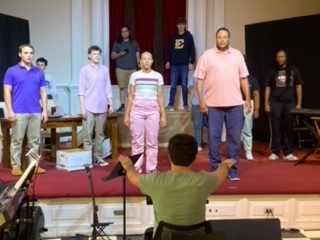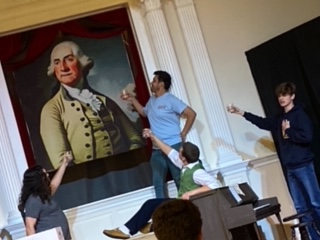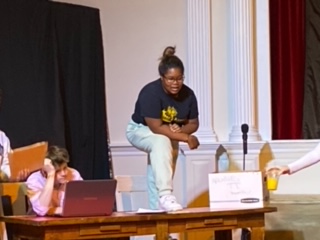
Speak Every Name. Every Story Tell.
“Speak every name. Every story tell,” sang the cast in the final anthem of NIGHTCAPS. https://www.nightcaps.show/ These lines, by playwright, Brooke Vandervelde, rang in my ears for days after the performance.

Then I began to hear two other anthems—certified by Key Influencers as hits. Certainly worth a blog.
DEEP TROUBLES, DEEP POCKETS
Much as he was admired in his lifetime, Friedrich Schiller only became a Key Influencer after his death. The “Ode to Joy” might have become a drinking song about good fellowship—Gemütlichkeit—but in Beethoven’s hands, it became a hymn to friendship and freedom. To have experienced true friendship is to have realized that all humans are interdependently linked in ways that transcend custom, class, and history. All men are brothers, Schiller said. And Robert Burns echoed, “man to man, the wairld o’er/ Shall brothers be, for a’ that.”
They lived in a time to sing about joy, freedom, revolution, fraternity, and new possibilities as European society seemed to be opening up. But this very optimism made the injustices of custom, class, colonialism, slavery and indenture, privilege, and industrialism to be felt more keenly. Burns wrote about the “toils obscure” of working people, and Goldsmith, surveying the dilemma of what we call the Suits & Boots, wrote, “Ill fares the land, to hastening ills a prey/ where wealth accumulates and men decay.”
Working people have always seen the other side of the good life. They are close to the extractions and exploitation upon which wealth and civilization rest. Indigenous people were worked to death in the silver mines of Potosi, the diamond mines of Kimberly, and the coal mines of Wales. Like John Henry, the steel-driving man in the Big Bend Tunnel, Merle Travis’s miner in Muhlenberg, Kentucky gave “muscle and blood, and skin and bones” for the company store. For every Deep Pocket of power and influence, there are countless stories of Deep Troubles of dependence, resentment, desperation, anger, and self-blame.
Michael Paul Williams recently wrote about the ways that Deep Pockets of our corpocratic times have manipulated the Deep Troubles of working people for their own benefit.
Songs like those of Schiller, Burns, Travis, and the ballad of John Henry can speak the names and tell all the stories. But other kinds of songs can be used as decoys to turn attention away from public servants who do not serve, leaders who follow, and great benefactors who preach liberty and justice while undermining workers, schools, health, and habitat. Such songs can recruit animosity, nurse grievance, fan rage, cast blame, and incite action against scapegoats. Phrases like, “for people like me and people like you,” in the lyrics of Oliver Anthony, include the listener in the grievances about rich men in the north who “just wanna have total control” and about the “obese milkin’ welfare.” Phrases like “Around here we take care of our own,” in the lyrics of Jason Aldean[i], include the listener in the anger and worry that “one day they’re gonna round up” guns, and then the “good ol’ boys, raised up right” would have to fight unarmed.
I don’t want to be included as the listener in either case. Song-makers have always had the choice to inform or to inflame, to challenge or to indulge their listeners. Consider the work-songs and “Sorrow-songs,” as W.E. Dubois called them, of enslaved Americans.
These spiritual songs draw on what DuBois called the “double-consciousness” of knowing who you are but also knowing how you are perceived by white Americans, who probably hold you in contempt as a representative of an excluded class. The many-layered music of the enslaved working-people who made these songs embodies grief, guilt from the forced acceptance of indignity, and anger, but it also embodies a conviction of ultimate justice and a summons to strive—even with oneself.
I do not find these qualities in the current hit-parade of worker-anthems. Songs that summon us to strive for justice, fraternity, and cooperation seem closer to the world that Schiller was trying to imagine in 1785.

Here is my own addition to the working-song genre, a number from my yet-unproduced opera, Escape Plans. It is entitled “Deep Water Horizon,” the lyrics given below. Unlike NIGHTCAPS, there is no cast to show off the piece to good advantage, so what you get is a rough rendition with me singing and switching props. Try to overlook the mistakes!
GO TO LINK:
Deep Water Horizon
On April twenty, twenty-ten, the rig began to shake.
“Keep pumping,” cried the foreman. “No time to take a break.”
Deep Water Horizon. Deep Pockets, you know.
Deep Trouble’s arisin’ from bubbles down below.
The slick line seized. The sea turned black.
A fireball from below blew roustabouts all off the deck.
Like duckpins in a row.
Deep Water Horizon. Deep Pockets, you know.
Deep Trouble’s arisin’ from bubbles down below.
Five million barrels in twelve weeks: the oil slick snaked its way
And coiled itself around our lives and never went away.
From Petit-Anse to Plaquemines, in hearts, bayous, and Bay,
The swill backs up around our lives and never goes away.
Deep Water Horizon. Deep Pockets, you know.
Deep Trouble’s arisin’ from bubbles down below.
END
[i] Song by Lovelace, Thrasher, Kennedy, and Allison.

I like it! Someone else to check out who writes and sings modern protest songs: Pat Wictor, of the trio Brother Sun.
THANKS, ANN!